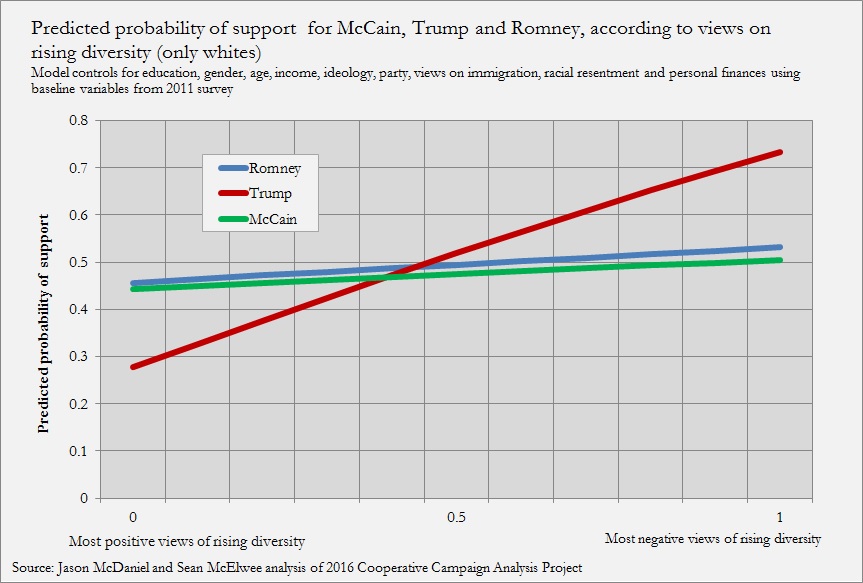In previous analyses of Trump’s support during the primaries, we showed that racial resentment played a larger role in the 2016 election than economic concerns. Recently released survey data allows us to ascertain in what ways Trump’s general election support compares to previous elections. The data also give us the opportunity to focus in on those voters who switched from Obama in 2012 to Trump in 2016, and compare them to those voters who did not support Trump in 2016 but voted for Romney in 2012.
We find that opinions about how increasing racial diversity will affect American society had much more impact on support for Trump during the 2016 election compared to support for the Republican candidates in the two previous presidential elections. We also find that individuals with high levels of racial resentment were more likely to switch from Obama to Trump, but those with low racial resentment and more positive views about rising diversity voted for Romney but not Trump.
In short, our analysis indicates that Donald Trump successfully leveraged existing resentment towards African Americans in combination with emerging fears of increased racial diversity in America to reshape the presidential electorate, strongly attracting nativists towards Trump and pushing some more affluent and highly educated people with more cosmopolitan views to support Hillary Clinton. Racial identity and attitudes have further displaced class as the central battleground of American politics.
Well no kidding, racists voted for Trump.
To test how views on diversity affected voting during the 2016 election, we created a model that controls for age, race, education, income, gender, party identification, concern about rising immigration, racial resentment, and worries about personal finances. In order to provide some historical context for how Trump reshaped the electorate, we also modeled voting for Mitt Romney in 2012 and John McCain in 2008.
The results, displayed in the chart below, show that probability of support for Trump increases sharply with negative views on rising diversity, and positive views towards diversity decrease the probability of voting for Trump. Interestingly, these attitudes have no significant effect on probability of voting for Romney or McCain.
While race and racial attitudes have been and continue to play an important role in support for Republican presidential candidates, fears about growing racial diversity appear to be uniquely important to support for Trump compared to previous Republican candidates. Although our analysis does not speak to whether these attitudes were primed by Trump’s campaign, or whether he capitalized on emergent attitudes and rode them to victory, it seems clear that they will play a key role in the future of the Republican Party.
Trump: number one with racists because he made racism acceptable again, and he won a narrow victory because of it. I could have told you that living here in Northern Kentucky.
Still, the lesson remains that the GOP has fully embraced racism now, and whether or not you hold Trump's awful views on "the blacks" and "the Mexicans" remains irrelevant: people who voted for the GOP and for Trump specifically are okay with a leader who represents them having those views.
We now have a party and country led by people who accept that as a acceptable quality in their politicians, period. I don't care about why you voted for the racist. you still voted for the racist.
End rant.





No comments:
Post a Comment